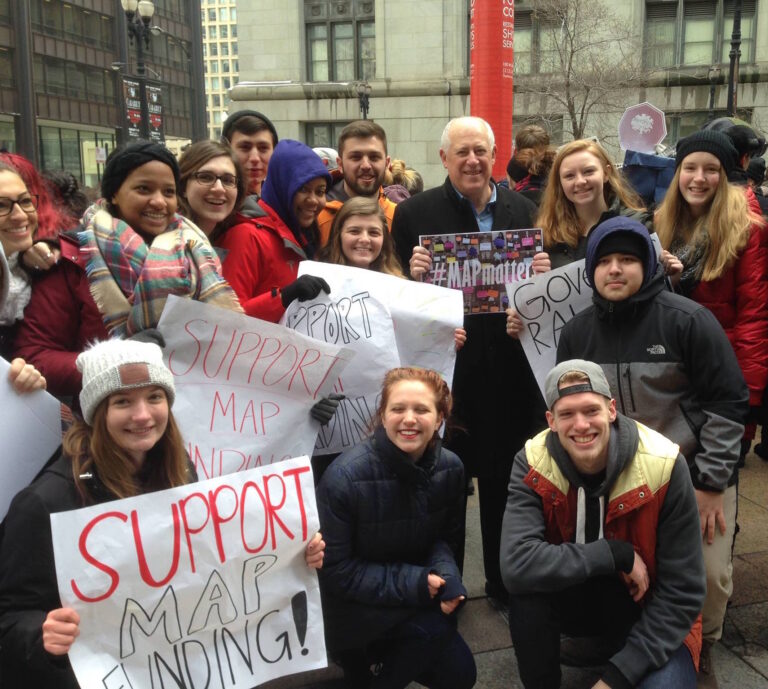Editor’s Note: The Monetary Award Program (MAP) has provided grant funds for Illinois residents to attend college in the state since 1967. The State of Illinois budget, which includes authorization for this program, ran out on July 1, 2015, leaving many students and universities (including ��ݮӰ��) vulnerable to funding shortages. Significant coverage has been given by news outlets to the impact of the budget impasse on higher education. Here, Professor Jon Peterson offers some background of how the state arrived at this point, as well as thoughts on what must happen at the state level to restore these funds.
The current issue of the Spectrum, ��ݮӰ��’s student magazine, addresses this issue in a , director of financial aid.
By Dr. Jon Peterson, assistant professor of politics and government
 We currently have no MAP grant funds because Governor Bruce Rauner and the Illinois General Assembly (that is, the state house and the state senate) have failed to pass a state budget. We do not have a state budget because our Republican governor and our Democratic legislative majorities have very different opinions about how to fix the serious problems in our state’s finances.
We currently have no MAP grant funds because Governor Bruce Rauner and the Illinois General Assembly (that is, the state house and the state senate) have failed to pass a state budget. We do not have a state budget because our Republican governor and our Democratic legislative majorities have very different opinions about how to fix the serious problems in our state’s finances.
Last spring when and Democratic legislative leaders (like House Speaker and Senate President ) began negotiating the budget, the state estimated it would collect about $32 billion in taxes in 2016. The problem is, just to keep state services at last year’s levels, the state needed $38 billion. So, to fix a $6 billion gap in state finances, our state leaders had three choices: 1. cut services by reducing spending; 2. collect more money by raising taxes; or 3. some combination of both.
Governor Rauner chose the first option. He proposed a budget with no tax increases and steep spending cuts. Democrats in the General Assembly rejected the governor’s proposal and chose the third option. They passed a series of budget bills that increased taxes and cut spending. But according to the governor, those bills did not cut spending enough, since they would have spent $4 billion more than the state would have collected in taxes. As a result, Rauner vetoed every budget bill except the one that paid for public elementary and secondary schools.
Since the governor and state legislators failed to pass a budget, every state agency and program (other than public schools) technically ran out of money on July 1, 2015. But a series of court orders has forced the state to continue paying state workers and funding state programs at about 90 percent of their 2015 levels. The budget gap remains, however, and Illinois is now spending money faster than it is collecting it. By the end of June, we will overspend by more than $4 billion.
This budget standoff forms the backdrop of the debate. The bill funding MAP grants was one of the budget bills that Governor Rauner vetoed last spring, so the program is currently unfunded. At the end of January, the General Assembly approved , which included full funding ($373 million) for MAP grants. Governor Rauner on February 19, arguing that the state does not have the money to pay for the program. He also wants the General Assembly to give him new authority to make spending cuts during financial crises. Republicans in the legislature have introduced a bill that would give the governor this authority and fully fund MAP grants. But they do not have enough votes to pass the bill, and Democratic legislators are unwilling to give up budget power to the governor.
The Illinois Constitution gives the General Assembly the ability to override a governor’s veto, but they need 3/5 of their members to agree to do it. As long as Republican legislators side with the governor, the Democrats did not have enough votes to override the governor’s veto. On March 1, a motion to override the governor’s veto was filed in the Senate, and it arrived to the House on March 2. However, the 3/5 majority vote to override was not successful, and the veto of SB2043 stands.
Looking forward, any successful MAP grant bill is going to need the support of both a majority in the Illinois General Assembly and Governor Rauner. And until that happens, 130,000 college students across Illinois will be left without their much-needed MAP grants.
is assistant professor of politics and government at ��ݮӰ��. His expertise is in the areas of American government and politics, public opinion and voting behavior, and religion and politics.
Follow ��ݮӰ�� on Learn more .


